Sayyed Farid Ahamed
Evaluating Query Efficiency and Accuracy of Transfer Learning-based Model Extraction Attack in Federated Learning
May 25, 2025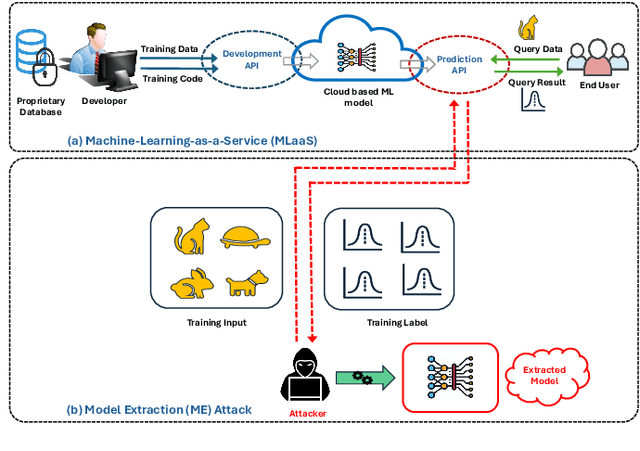
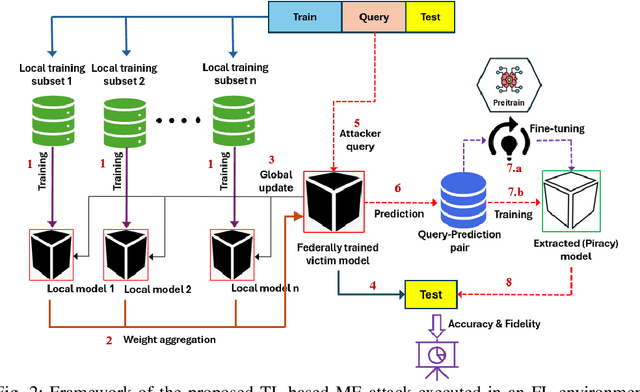
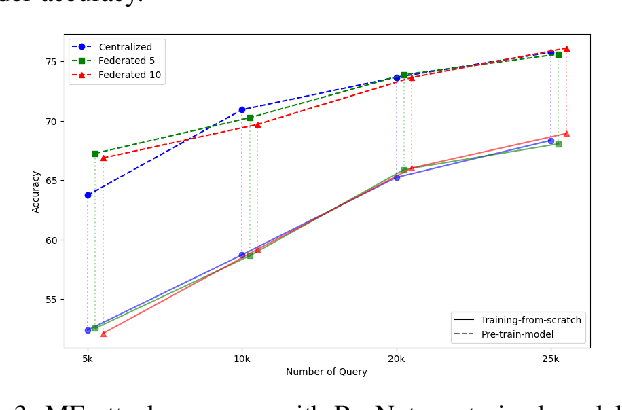
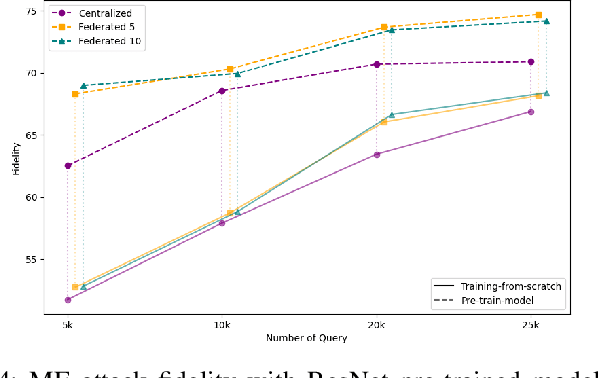
Abstract:Federated Learning (FL) is a collaborative learning framework designed to protect client data, yet it remains highly vulnerable to Intellectual Property (IP) threats. Model extraction (ME) attacks pose a significant risk to Machine Learning as a Service (MLaaS) platforms, enabling attackers to replicate confidential models by querying black-box (without internal insight) APIs. Despite FL's privacy-preserving goals, its distributed nature makes it particularly susceptible to such attacks. This paper examines the vulnerability of FL-based victim models to two types of model extraction attacks. For various federated clients built under the NVFlare platform, we implemented ME attacks across two deep learning architectures and three image datasets. We evaluate the proposed ME attack performance using various metrics, including accuracy, fidelity, and KL divergence. The experiments show that for different FL clients, the accuracy and fidelity of the extracted model are closely related to the size of the attack query set. Additionally, we explore a transfer learning based approach where pretrained models serve as the starting point for the extraction process. The results indicate that the accuracy and fidelity of the fine-tuned pretrained extraction models are notably higher, particularly with smaller query sets, highlighting potential advantages for attackers.
Privacy Drift: Evolving Privacy Concerns in Incremental Learning
Dec 06, 2024Abstract:In the evolving landscape of machine learning (ML), Federated Learning (FL) presents a paradigm shift towards decentralized model training while preserving user data privacy. This paper introduces the concept of ``privacy drift", an innovative framework that parallels the well-known phenomenon of concept drift. While concept drift addresses the variability in model accuracy over time due to changes in the data, privacy drift encapsulates the variation in the leakage of private information as models undergo incremental training. By defining and examining privacy drift, this study aims to unveil the nuanced relationship between the evolution of model performance and the integrity of data privacy. Through rigorous experimentation, we investigate the dynamics of privacy drift in FL systems, focusing on how model updates and data distribution shifts influence the susceptibility of models to privacy attacks, such as membership inference attacks (MIA). Our results highlight a complex interplay between model accuracy and privacy safeguards, revealing that enhancements in model performance can lead to increased privacy risks. We provide empirical evidence from experiments on customized datasets derived from CIFAR-100 (Canadian Institute for Advanced Research, 100 classes), showcasing the impact of data and concept drift on privacy. This work lays the groundwork for future research on privacy-aware machine learning, aiming to achieve a delicate balance between model accuracy and data privacy in decentralized environments.
Accuracy-Privacy Trade-off in the Mitigation of Membership Inference Attack in Federated Learning
Jul 26, 2024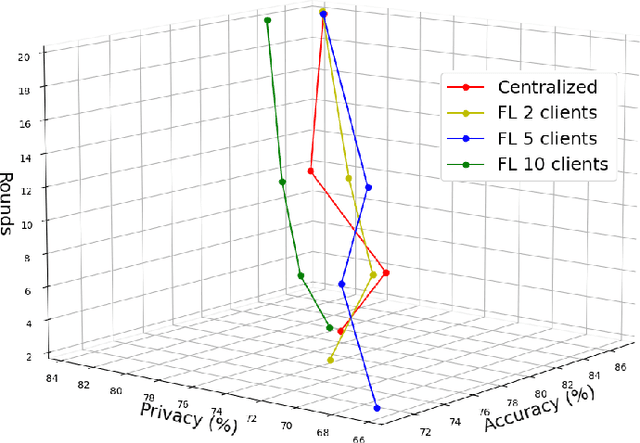
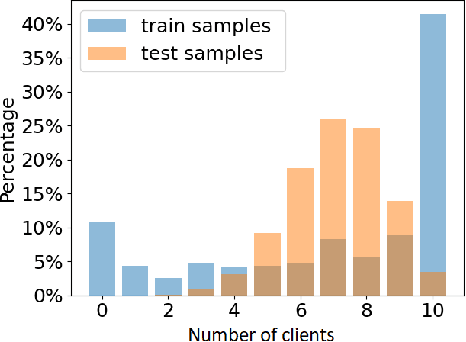

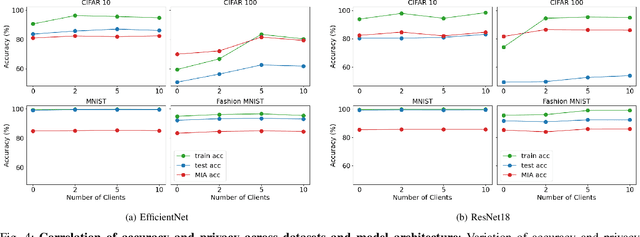
Abstract:Over the last few years, federated learning (FL) has emerged as a prominent method in machine learning, emphasizing privacy preservation by allowing multiple clients to collaboratively build a model while keeping their training data private. Despite this focus on privacy, FL models are susceptible to various attacks, including membership inference attacks (MIAs), posing a serious threat to data confidentiality. In a recent study, Rezaei \textit{et al.} revealed the existence of an accuracy-privacy trade-off in deep ensembles and proposed a few fusion strategies to overcome it. In this paper, we aim to explore the relationship between deep ensembles and FL. Specifically, we investigate whether confidence-based metrics derived from deep ensembles apply to FL and whether there is a trade-off between accuracy and privacy in FL with respect to MIA. Empirical investigations illustrate a lack of a non-monotonic correlation between the number of clients and the accuracy-privacy trade-off. By experimenting with different numbers of federated clients, datasets, and confidence-metric-based fusion strategies, we identify and analytically justify the clear existence of the accuracy-privacy trade-off.
MIA-BAD: An Approach for Enhancing Membership Inference Attack and its Mitigation with Federated Learning
Nov 28, 2023Abstract:The membership inference attack (MIA) is a popular paradigm for compromising the privacy of a machine learning (ML) model. MIA exploits the natural inclination of ML models to overfit upon the training data. MIAs are trained to distinguish between training and testing prediction confidence to infer membership information. Federated Learning (FL) is a privacy-preserving ML paradigm that enables multiple clients to train a unified model without disclosing their private data. In this paper, we propose an enhanced Membership Inference Attack with the Batch-wise generated Attack Dataset (MIA-BAD), a modification to the MIA approach. We investigate that the MIA is more accurate when the attack dataset is generated batch-wise. This quantitatively decreases the attack dataset while qualitatively improving it. We show how training an ML model through FL, has some distinct advantages and investigate how the threat introduced with the proposed MIA-BAD approach can be mitigated with FL approaches. Finally, we demonstrate the qualitative effects of the proposed MIA-BAD methodology by conducting extensive experiments with various target datasets, variable numbers of federated clients, and training batch sizes.
 Add to Chrome
Add to Chrome Add to Firefox
Add to Firefox Add to Edge
Add to Edge